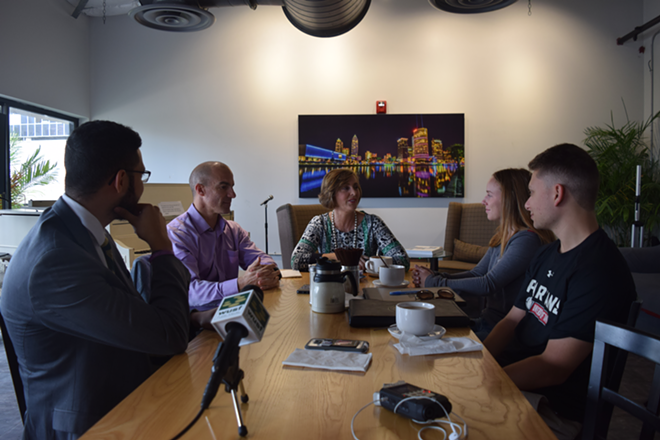
U.S. Rep Kathy Castor (D-Tampa) was joined by the student body presidents of Tampa's two universities for what was part brainstorming session, part preview for what Castor hopes will be a congressional push for an overhaul of federal student loan policy when she returns to Washington.
Moneer Kheireddine, Student Body President at University of South Florida, and Aislinn Sroczynski, Student Body President at University of Tampa, along with Student Body Vice President of UT Troy Schneider and Kostas Stoilas of the startup incubator Tampa Bay Wave, were on hand at The Attic in Downtown Tampa to discuss Castor's Student Loan Relief Act of 2017, along with voicing their personal stories about the consequences of student debt.
“I'm just nervous that I don't have the protections in place from these loans and if they're even payable once I graduate,” said Sroczynski. “That's going to be tough. I don't want to have to choose between taking a road that I'm passionate about and having to go into something I'm not passionate about because that's the job that's going to pay my loans off.”
Stoilas, a graduate of both Florida State University and UT and currently the Tampa Bay Wave's “Entrepreneur in Residence,” spoke of the restraints that his student loan debt has put on his efforts to develop new businesses, referring to the debt as 'the wolf at the door'.
“It's a big monthly expense. It's probably my largest monthly bill other than rent," Stoilas said. "If you're in business and looking at your expenses you have to account for it. It doesn't go away, you can't file bankruptcy. You have to keep it in mind when you're looking for a job or looking to start something.”
Kostas shares a common story with many local graduates, with UT graduates who received student loans graduating with an average of $31,000 in debt and USF graduates having an average of $22,000 to pay off.
Castor's bill would put some constraints on that debt by capping federal student loan interest rates at four percent for undergraduates and five percent for postgrads. While Castor has high hopes for the bill, she has cited the congressional fight on healthcare for much of the year and the current debate on Trump's tax plan as the major roadblocks for having a real discussion about the issue. Castor hopes to extend the Perkins Loan program, which had provided student loans to lower income families with 72 percent of recipients coming from families making less than $20,000 a year but expired at the end of September without much discussion.
“College education in America is supposed to be that ladder of opportunity,” said Castor. “If you come from a modest background, you can attend a HCC, USF or UT and break out. If Congress doesn't authorize the Perkins Loan, they are in essence saying, 'You are not our concern', while at the same time in D.C. the topic is how they can bring tax cuts to the richest one percent. It seems like the priorities are off.”
Castor also urged the students in attendance to push for lowering tuition and easing of student debt at the state level, a dedication that she feels has faded in Tallahassee.
“The state has kind of stepped back from a consistent commitment to higher education and shifted the burden to students and families. It has an impact on folks' ability to be successful, to start a business without the drag of longterm debt. Think about what you can do without that debt,” she said.
Kheireddine also spoke about efforts the student government at USF have made to ease the necessity of loans, such as replacing the requirement that classes to be paid in full at the beginning of the semester with a monthly plan.
As Castor brings the fight back to Washington, she is very aware of what the consequences of doing nothing about student loan debt could mean for the Bay Area.
“We have more students in college than just about any community in the state, and that's to our benefit. We're younger, we have more energy, we have more opportunity," Castor said. "But when they graduate tens of thousands of dollars in debt, that's a drag on the economy as a whole. That delays purchasing a vehicle, a home. They can't take the investments to grow a business or attend graduate school that they need to. It's already impacting all of us and it could be quite detrimental in the future.”















